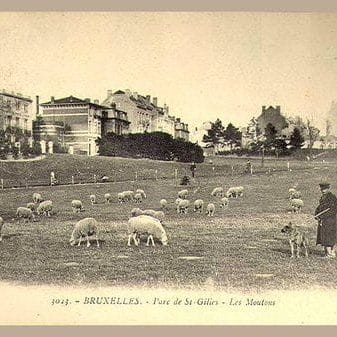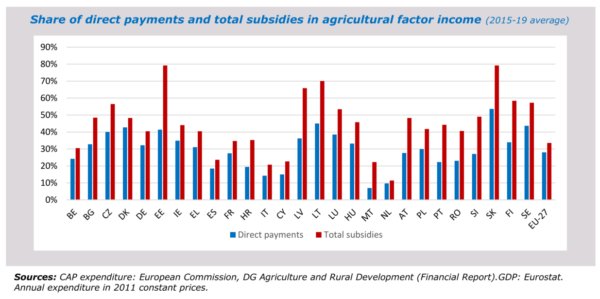Is there exnovation in agricultural policy?
Reducing pesticide use and beyond
Leonard Frank
03/11/2022

In this blogpost, Leonard Frank, reports about his research on exnovation or destabilisation governance in the agricultural sector, including about the pesticide policy in Germany. Leonard Frank is a researcher and doctoral student in Environmental Governance at Universität Freiburg (and Universiteit Utrecht).
A confluence of multiple crises currently shines a spotlight on some of the weaknesses of European food systems. Most recently, in May 2022, as wheat supplies from Ukraine (and partially Russia) – together accounting for around 20% of global wheat exports – were blocked from entering the world market, European countries reacted by temporarily suspending environmental regulations for the benefit of short-term food security. While the European Commission suggested to use so-called ecological focus areas such as fallow land for growing crops, the German agricultural minister Özdemir – a member of the Green party – suggested to suspend the introduction of mandatory crop rotation rules. Of course, food systems also come into focus because of globally rising food prices and the drought currently striking half of Europe’s land. Two years ago, it was the disruptions to food supply chains from the Covid-19 pandemic. Both suggestions essentially aim at relaxing agri-environmental regulations in order to increase European agricultural production. However, they warrant the question which governance approach these regulations represent in the first place. It appears that a shift towards sustainable agriculture is to be achieved through minor corrections in environmental regulation and incremental change in farming practices. Repealing these regulations sets European agricultural policy a small step back in its path to reducing the environmental impacts of food and fibre production.
Exnovation for a sustainability transition in farming
And these impacts are vast. Agricultural production (as a subsector within larger food systems) contributes greatly to a range of the most pressing sustainability challenges, from greenhouse gas emissions and biodiversity loss to nutrient leaching into soils, water and air. Addressing these fundamental issues would require governance approaches and policy for a sustainability transition in agriculture. Such transition governance needs to take a dual perspective: On the one hand, it needs to support new, more sustainable farming solutions, ranging from community supported agriculture to data-driven precision farming. Just as importantly, however, it needs to deliberately destabilise locked-in, unsustainable configurations of farming systems on the other. One way to achieve this is through policies for exnovation: actively removing existing infrastructures, technologies or practices. Examples for such policies are the phase-outs of the pesticide DDT, nuclear power plants or incandescent lightbulbs.
The need for such destabilisation governance approaches has been shown in energy or mobility systems, and numerous examples for this are collected on this blog and website. What distinguishes agriculture from other sectors, however, is the centrality of agricultural policy not just in setting regulatory standards, but for determining the economic viability of current farming systems. Across the European Union, subsidies make up on average 33% of farm income[1]. In a sector in which the economic margins of farm businesses are small and many farmers are producing bulk commodities, this highlights that the current, unsustainable system of agricultural production is largely shaped by agricultural policy. The latter is therefore a potentially powerful lever for sustainability transition governance.

Reducing pesticide use as exnovation
One of the central issues where exnovation governance becomes relevant for agricultural policy is the reduction of pesticide use. Pesticides are a highly politicised issue. In many European countries, the years before the pandemic saw steadily increasing numbers of environmental organisations, farmers and citizens in protests for or against more stringent environmental farming regulation – and pesticides, especially glyphosate, were one of the central issues in these protests. The difficulty – and part of the reason behind the controversies – is that there is no direct substitute for chemical pesticides. To be sure, farming methods exist that do without them, such as many traditional methods or organic agriculture. However, these methods require substantially different farming systems and include changes in crop varieties and rotations, field sizes, soil management and many more aspects.
But what could policy that aims at regime destabilisation actually look like? In a recent journal article[2], we traced attempts for reducing pesticide use in Germany. Importantly, much of the policy for pesticide reduction in Germany is not made in the German ministry for agriculture, but also in the ministry for the environment, and centrally also on the European level, where most fundamental decisions around agricultural policy are taken. But even as these decisions are made within European institutions, Member States have considerable freedom to implement them.
We identified three different aspects of exnovation governance in German pesticide policy.
What are the policy discourses around pesticides ?
First, policy debates revolve around the right strategy to reduce pesticide use: should Government aim to support technological innovations that could reduce the need for pesticides in the long run, or should it focus on regulatory restrictions of its use? Moreover, the number of policymakers sharing the conviction that pesticides (especially glyphosate) are essential for the economic viability of farms decreased over time. This influenced statements about the appropriate level of stringency of the measures. More generally, how policy makers and stakeholders make sense of the perceived problems, solutions and modes of coordination that are necessary for exnovation changes over time, and political agendas shift in the process.
What are the policy instruments ?
Second, a broad range of policy instruments is used for reigning in pesticide use. Agricultural policy contains measures that systematically addresses different leverage points of pesticide-based farming: measures target the approval of active substances, restrict areas of pesticide application (for instance in public parks or near bodies of water), regulate application equipment or mandate farmer training. While such control policies are numerous, significant changes of the regulations and rules that support pesticide-reliant agriculture are few and far between. Where they do exist, they often lack stringent and legally binding implementation. For example, European pesticide regulation sets Integrated Pest Management, in which chemical pesticides are only part of a broader crop protection strategy containing also preventive and curative measures, as the standard approach for plant protection. However, Integrated Pest Management is neither clearly defined nor stringently implemented across EU member states, such that the measure has little effect.
Which pathways and directions of change ?
A third aspect of exnovation governance is the development of policy goals and reduction pathways in pesticide policy. These show a clear picture: the targets of pesticide policy have changed towards controlled and reduced use over the past 20 years. This trend is much clearer on the European level, where, 20 years ago, policy documents stressed the centrality of pesticides for agricultural production. Today, they require a 50% reduction in the quantities of plant protection products. This reduction target has recently been taken up as a strategic goal on the German level as well, but again without legally binding implementation. Tracing these developments makes visible the political struggles around policy goals, as well as the speed and scale of destabilisation processes.
Looking at the discourses, policy instruments and reduction pathways together reveals that despite important changes, agricultural policy falls short of effectively reigning in pesticide use. Pesticide use in Germany has remained largely stable in the past 20 years. Instead, political struggles come to the fore. Taken together, these three perspectives on destabilisation governance reveal how agricultural policy very often does not actually aim at phasing out an unsustainable mode of production, but actually at stabilising the agricultural system. At the same time, there is now strong pressure for change towards more sustainable farming through increasing a societal recognition of the problem and increasingly stringent European policy goals, many of which have spilled over from environmental policy, including the 50% pesticide reduction target.
The politics of destabilisation
Sustainability transitions, as we have seen, require that unsustainable systems like farming based on high pesticide use are destabilised, such that more sustainable alternatives can develop. But destabilising such an entire system is of course not a politically feasible goal. Policy makers who have spent their lives upholding and supporting the stability of farming are unlikely to want to shake and unlock it. However, there are many cases in which a particular substance (such as the pesticide DDT) or technologies (such as nuclear power generation) have been phased out. Thus, phase-out policies – or exnovation – targeting only one particular system element such as pesticides after it has been identified as the culprit might be politically more palatable. However, this necessarily reduces systemic complexity to an unreasonable degree – it is not simply a particular pesticide that is the problem of current agricultural production. Instead, it is a farming system that is based on using large quantities of pesticides that needs changing.
There are, however, some signs of change. After the United Kingdom has left the European Union, the country is now adopting a new agricultural policy to replace the previous European legislation. In this process, agricultural reform after Brexit has become a sort of field experiment for reforms of the European Union’s Common Agricultural Policy. In UK post-brexit agricultural policy, some more radical, systemic discourses are gaining prominence and clearly disruptive interventions that go against farming groups’ interests being favoured and becoming part of the policy mix. However, the environmental impacts of these changes are at best unclear – we will have to wait for the results of this massive field experiment.
As a whole, destabilisation, phase-out or exnovation are examples of what Frédéric Goulet and Dominique Vinck call “innovation through withdrawal”[3]: removing something from a system in order to create a new mode of farming. Such a withdrawal always changes how the system works: if pesticides are no longer an option, farmers will develop new ways of farming. These new ways of farming will be substantially different and in many ways unexpected, but centrally, they need to be geared towards sustainability objectives and avoid locking in other environmentally harmful ways of farming. Many farmers will struggle to get there. Agricultural policy should incorporate such exnovation measures, and continue to accompany farmers along the way.
References
[1] European Commission (Ed.) (2021): Share of direct payments and total subsidies in agricultural factor income (2015-19 average). Common Agricultural Policy – Key graphs and figures, updated on October 2021, checked on 9/19/2022.
[2] Frank, Leonard; Schanz, Heiner (2022): Three perspectives on regime destabilisation governance: A metatheoretical analysis of German pesticide policy. In Environmental Innovation and Societal Transitions 44, pp. 245–264. DOI: 10.1016/j.eist.2022.07.002.
[3] Goulet, Frédéric; Vinck, Dominique (2012): L’innovation par retrait. Contribution à une sociologie du détachement. In Revue française de sociologie 53 (2), p. 195. DOI: 10.3917/rfs.532.0195.
